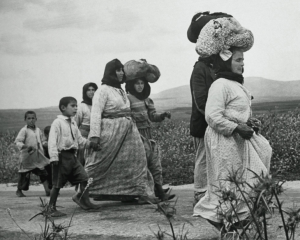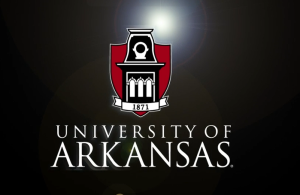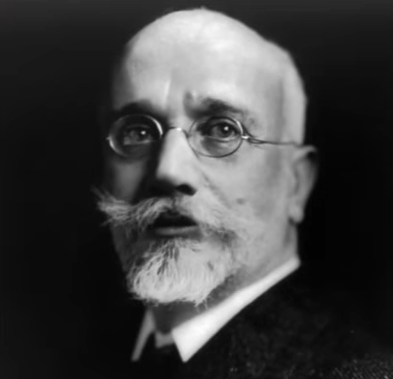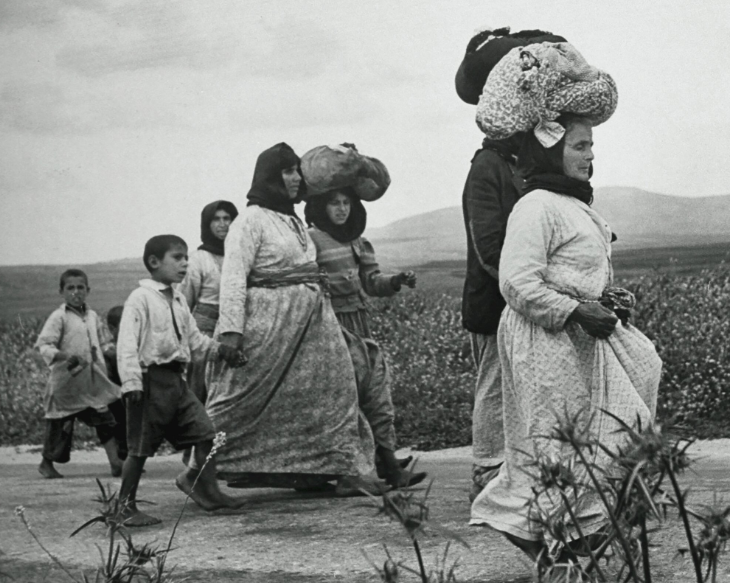Readers of the articles on this website may enjoy this stimulating essay from The Realist Review which draws a startling parallel between the Greek prime minister Eleftherios Venizelos (pictured) who sought to exploit Turkey’s temporary weakness at the end of the First World War to create a vast Greek empire on its territory and Netanyahu who is exploiting the temporary weakness of the Arabs in the Middle East to create a Jewish empire in their midst.
Netanyahu Repeats Venizelos’ Error
The Israeli premier does not know when to stop…
Martin Sieff, 17 September 2025
The name of Eleftherios Venizelos does not exactly trip easily off the tongue and literally no-one outside his native Greece now ever remembers him. No one in modern 21st century Greece wants to remember him either: His megalomaniac ambition brought total catastrophe on the Greek people – and their worst massacre and suffering since medieval times.
But in his day, the silver tongued, pheromone-blessed, extraordinarily charming leader of his tiny nation conned the Great and the Good Masters of the World who had just emerged triumphant from World War I.
The Big Three at the 1919 Paris Peace Conference, US President Woodrow Wilson, French Premier Georges Clemenceau and British Prime Minister David Lloyd George, along with Lloyd George’s maniac right hand man, British Secretary of State for War Winston Churchill, thought Venizelos was one of the greatest statesmen who ever lived and a figure worthy to stand alongside Alexander the Great as a Conqueror and Civilizer of the supposedly inferior, non-white races of Asia.
This, of course, tells us even more about Wilson, Lloyd George, Clemenceau and Churchill – none of it good.
Yet Israeli Prime Minister Benjamin Netanyahu’s wild over-extensions today fighting ambitious wars against Syria, Gaza and Iran at the same time eerily echo Greek Prime Minister Venizelos’ insane attempt to carve out a Greek Empire in Turkey after World War I. The result was the greatest catastrophe in the modern history of Greece.
It is for that very reason that Venizelos needs to be remembered today – not with awe but with loathing and contempt for his wild fevers and imaginations of strategic over-extension. For his “errors” eerily prefigured the repeated hubris and disastrous neo-imperialist “democracy-building” misadventures of the United States and its allies over the past quarter century around the world, from Afghanistan, Iraq to Libya, Syria and Ukraine.
Now Venizelos’ hyperenergetic and supposedly “visionary” (in reality, demented) dreams of conquest, empire and military glory prefigure the current Israeli government’s determination to carve out a mini-empire in Syria, occupy all of Gaza permanently, impose its will on Southern Lebanon and bring Iran – with the help of course of the United States – to unconditional surrender – all at the same time.
That is quite an agenda for a tiny nation of only seven million, one million of whom are fanatical religious extremists openly dedicated to seizing control of their traditional democracy and turning it into a wildly repressive theocratic dictatorship, while sending millions of more reasonable and moderate Israelis to carve out their wild religious fantasies at the same time.
For all these people, and for Netanyahu, the so-called vision of Venizelos – and the catastrophic fate he led his country into, needs to be exhumed from the dark dungeons of forgotten history where it has resided for the past century. Because, like a recurring nightmare, that same dark dream is being reenacted before all our eyes in the 21st century Middle East.
Venizelos led a tiny nation of 5.5 million people at the time – comparable to the 7 million in Jewish Israel today. Like Netanyahu and his religious-nationalist allies in the current Israeli government, he was entranced by fantastic visions of a mythical past he was convinced he could revive.
The Ottoman Turks, one of the most successful and powerful warrior races across the entire world over the previous 600 years, had just been defeated in World War I. The old Ottoman Turkish Empire had been destroyed by the armies of Britain and France who were determined to carve up its vast territories across the Middle East and North Africa for themselves.
Venizelos, attending the interminable, chaotic 1919 Paris Peace Conference, hugely impressed and charmed the Big Three leaders – Wilson, Clemenceau and Lloyd George. He impressed Churchill so much that a quarter of a century later Churchill still approvingly quoted Venizelos in his classic World War II speeches, as if anyone else remembered him, or as if his policies and visions actually meant something.
However, at the time it was no joke. Churchill had been defeated and humiliated by the Turkish army led by its greatest general and national hero Mustafa Kemal – later acclaimed as Ataturk, the father of his reborn nation – in the ghastly Gallipoli campaign of 1915. It cost the allies 200,000 dead and maimed for life.
So heavy was the slaughter of young Australian and New Zealand soldiers under their extraordinarily lazy, stupid and inept British commanders that both countries suffered higher death and casualty rates during World War I as proportions of total population than even Britain, France, Germany and Russia did.
Still, eventually the Turks had been defeated at last. In 1919, British and French forces fulfilled the supposed Dream of Ages and for the first time in more than 460 years, Christian European armies occupied the ancient city of Constantinople.
Yet none of that was enough for Venizelos. He had grown up hating the Moslem Turks who until the 19th century actually had a record of relative tolerance for their Orthodox Christian minorities. Venizelos believed the ancient glories of Classical Greece could and should be revived at once in a neo-Greek Empire occupying western Asia Minor.
Churchill thought this was a good idea too. So did Lloyd George and Clemenceau. British and French weapons were poured out to the Greeks, much as the United States and its NATO allies poured similar bonanzas of equipment into the national armies of Iraq, Afghanistan and post revolutionary Ukraine, with no regard whether the corrupt, tiny, inexperienced and ramshackle militaries in those countries could actually learn how to use them or operate coherently at all.
Even worse, like Ukraine’s Volodymyr Zelensky backed by the Biden administration in the United States and then-Prime Minister Boris Johnson, Churchill and the Big Three in 1919 were urging Venizelos on to attack and conquer a far more numerous people with a tremendous military tradition in its own homeland.
The Turkish population of Asia Minor in 1920 was 16 million, more than twice the total population of the state of Greece. And it was filled with veteran military survivors of the Ottoman Empire’s bloodbath wars against Britain, France and Russia throughout World War I.
The Turks had already lost more than a million dead. Now they were not even being allowed to mourn their lost loved ones in peace. Their own homeland was threatened.
The Greek army moved in, occupying, burning, ravishing, clearing the war for a new generation of Greek settlers who, no doubt would revive the glories of Socrates and Pythagoras for another thousand years. It was all ludicrous and quite mad. Churchill believed all of it.
But it all went wrong: Fast. Venizelos, who was also a divisive figure among his own people, lost an election and was expelled from power at the end of 1920. Then, the Turks fought back. And they rapidly found a natural leader, Mustafa Kemal. He led one of the most rapid and extraordinarily military and national revivals of all time.
The well-equipped but untrained, inexperienced Greeks, occupying a supposedly mythical homeland they knew nothing about, were first harassed, then counter-attacked and finally defeated in a long, ferocious battle in the heart of Asia Minor in 1922. They broke and fled in a headlong retreat. A revived, formidable Turkish popular army swept after them. Everything Greek and Christian in their paths were destroyed.
Hundreds of thousands of Greeks who had lived among the Muslim Turkish majority in peace for untold centuries were now either massacred or forced to flee for their lives.
Like so many other megalomaniacal lunatics before and after him, Venizelos had been convinced the British and French Empires were enormous, invincible, all-powerful. And that he could get them to kill all his enemies for him. Netanyahu and Volodymyr Zelensky are both still walking in his footsteps today.
However, Britain and France had both lost a million young men dead each in World War I, with millions more crippled for life or doomed to die in their 30s and 40s from the hideous effects of mustard gas in the nightmarish battles of the Western Front. The British and French publics were heartily sick and tired of Lloyd George, Churchill and Clemenceau and their visions of glory bought at the price of so much blood, suffering, heartbreak and death.
By 1922, all of Venizelos mighty allies and protectors in whom he had trusted so long, were out of office. By an agreement at Lausanne in 1923, 1.2 million remaining Greeks in Western Asia Minor were repatriated to tiny Greece. Venizelos ‘ dreams of ancient glory had destroyed a society that had endured for three thousand years.
And so, the full nightmare played out against the Greek peoples of Asia Minor, British and French naval fleets evacuated hundreds of thousands of terrified, impoverished Greek refugees from the great city of Smyrna, which the avenging Turks promptly burned to the ground.
Yet Ataturk was no Napoleon or Hitler, and no Churchill either. He was utterly ruthless and remorseless in defending his own people, but once they were safe, he sought peace not war and he created a modern Westernized Turkey that then spent a long century recovering from the horrors of eight years of bloodbaths from 1914 to 1922.
Indeed, before he died in 1938, an ailing Ataturk gave a radio message of comfort to the bereaved families of Australia and New Zealand, so many of whose innocent sons had died in vain for Churchill’s fantasies of glory at Gallipoli in 1915.
Lloyd George and Clemenceau never held power again. Churchill shamelessly reinvented himself as a cost-cutting de-mobilizer of armies through the 1920s, though he still tried – unsuccessfully – to spray Arab tribes in southern Iraq, including women and children, with poison gas. Even the British Cabinet of the 1920s refused to contemplate that. Churchill despised them openly as wimps.
Venizelos, like Churchill, showed endless resilience and lack of shame. He contrived to return as prime minister of Greece and even concluded a peace agreement with Turkey, led by his old enemy and nemesis Ataturk. Evicted from office again in 1933, he was involved with yet more intrigues and plots by his supporters to return him to power. Many of them were executed as a result.
In a pattern by then half a century long, to fall for Venizelos’ mellifluous oratory and noble visions – allegedly – led his followers to massacre, slaughter in wars and finally execution as traitors by their own people. He finally died in 1936. Churchill still thought the world of him.
The parallels between Venizelos’ long and remorselessly catastrophic career and that of Netanyahu in Israel today should be obvious.
Like Venizelos, Netanyahu has been an eminent national leader since a very young age. Like Venizelos, he has repeatedly returned as prime minister over the decades.
And like Venizelos, he combines a visceral hatred of the traditional next door Muslim neighbor nation and national nemesis – the Palestinians – with an unsurpassed skill at flattering and impressing successive leaders of the dominant global Western Imperialist powers that he alone knows how to solve the problems of his entire region, if only they will give him unlimited weapons and military support to do the job.
But like Venizelos, Netanyahu has not known when to stop. The general caution that wisely restrained him for most of his periods in office since 2009 has since 2022 been succeeded by a Venizelos-scale delusion that the nation and its destiny is inseparable from him personally and that national survival is inconceivable without him.
Now, like Venizelos after World War, Netanyahu imagines that a sympathetic and compliant Republican administration in Washington will give him carte blanche, a free hand, not only to permanently occupy and crush tiny Gaza, but also to carve out an Israeli mini-empire in western Syria as well.
Instead, it is the Israeli army, the most powerful and consistently successful military force in the Middle East now for almost 80 years, that is being ground down, demoralized and exhausted. even with continued US support.
Netanyahu and his supporters are running out of cannon fodder from their own population. As Venizelos and the Greek Army found in Asia Minor in 1920 and 1921, when an exhausted, overextended force that has been pushed too far, too fast, for too long into territories it does not know, and where its old strengths and tactics do not work, only total ruin can follow. And when it follows it is inexorable, total and terrible.
Neither Netanyahu nor his many supporters in the United States have ever shown any sign that they have even heard of Eleftherios Venizelos. It is time they wised up – and fast. For the fearsome doom he brought upon the people of Greece may soon come upon them too.
| A guest post byMartin Sieff Martin Sieff has 3 Pulitzer nominations for International Reporting, covered 70 countries and 12 wars. He was a Senior Foreign Correspondent for The Washington Times, Chief News Analyst for United Press International and is the author of nine books. |













